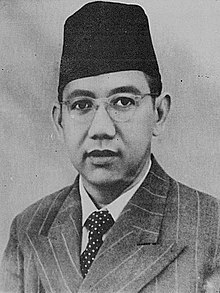Wahid Hasjim
Wahid Hasjim (also Hasyim , born June 1, 1914 in Jombang , † April 19, 1953 in Cimahi ) was one of the most important representatives of Indonesian Islam towards the end of the Japanese occupation and the first Indonesian minister for religious affairs in the government of President Sukarno in 1945 and again from 1949 to 1952. He was the son of the Nahdlatul Ulama founder Hasjim Asy'ari and himself became the leader of this Islamic organization. He was succeeded in this role by his son Abdurrahman Wahid , who later became President of Indonesia .
Role in the 1945 constitutional process
When tensions between the nationalist and Islamic camps increased in June 1945 during the drafting of the Indonesian constitution, Hasjim was selected as the representative of the Islamic camp for a commission to work out a compromise. The compromise that the Commission agreed on was the so-called Jakarta Charter . It consists of the fifth principle of the Pancasila , the belief in the One and Only God, being put in the first place and supplemented by the seven-word formula: "with the obligation of adherents to observe the Sharia of Islam" When the objection was raised at further meetings of the commission in July 1945 that the seven-word formula could generate fanaticism among Muslims because they were forced to apply the Sharia, Hasjim defended the formula with the argument that the pancasila also did provide for joint consultation and thus there can be no compulsion.
He also proposed an amendment to Article 4 of the Constitution requiring the President of Indonesia to be a Muslim. Furthermore, contrary to Article 29, Islam should be the religion of the state. Hasjim said that an Islamic orientation of the state was necessary, because this was the only way to motivate Muslims to fight in the event of a necessary defense against external enemies. Hasjim's proposals, however, were all rejected by the nationalist camp.
literature
- Arskal Salim: Challenging the secular state: the Islamization of law in modern Indonesia . University of Hawaii Press, Honolulu, 2008. pp. 64-67.
supporting documents
- ^ BJ Boland: The Struggle of Islam in Modern Indonesia. The Hague: Martinus Nijhoff 1971. Slightly Revised Reprint 1982. p. 26.
- ^ Salim: Challenging the secular state . 2008, p. 64.
- ^ Salim: Challenging the secular state . 2008, p. 65.
- ^ Salim: Challenging the secular state . 2008, p. 66.
| personal data | |
|---|---|
| SURNAME | Hasjim, Wahid |
| ALTERNATIVE NAMES | Hasyim, Wahid (alternative spelling) |
| BRIEF DESCRIPTION | Indonesian politician and minister |
| DATE OF BIRTH | June 1, 1914 |
| PLACE OF BIRTH | Jombang |
| DATE OF DEATH | April 19, 1953 |
| Place of death | Cimahi |
